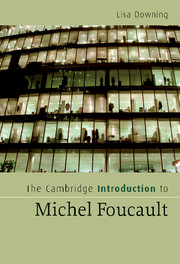Book contents
- Frontmatter
- Contents
- Preface
- List of abbreviations
- 1 Life, texts, contexts
- 2 Works: madness and medicine
- 3 Works: the death of man
- 4 Works: authors and texts
- 5 Works: crime and punishment
- 6 Works: The History of Sexuality
- 7 Critical receptions
- Afterword
- Notes
- Selected further reading
- Index
- The Cambridge Introductions to …
2 - Works: madness and medicine
Published online by Cambridge University Press: 05 September 2012
- Frontmatter
- Contents
- Preface
- List of abbreviations
- 1 Life, texts, contexts
- 2 Works: madness and medicine
- 3 Works: the death of man
- 4 Works: authors and texts
- 5 Works: crime and punishment
- 6 Works: The History of Sexuality
- 7 Critical receptions
- Afterword
- Notes
- Selected further reading
- Index
- The Cambridge Introductions to …
Summary
I had been mad enough to study reason; I was reasonable enough to study madness.
Michel FoucaultThe History of Madness
Foucault's earliest research interests and publications focused on the institutionalisation of medicine, particularly psychiatry in the nineteenth century, in tandem with a fascination with the transgressive potential of madness as an artistic and political force. As I suggested in Chapter 1, Foucault's opus is characterised by a tension between an interest in experience and subjectivity on the one hand, and a devastating critique of these concepts on the other. It is in his early work on madness that the concern with experience – a methodology haunted by something resembling phenomenology – is most visible.
Foucault wished to write a revisionist history of mental illness that would upend the commonplace received view regarding the liberalisation of the treatment of the mad with the birth of modern psychiatry. His investment in this topic and the perspectives from which he approaches it are ambiguous and, potentially, contradictory. Having read philosophy at university, Foucault's interest then turned to the discipline of psychology, and in 1952 he was awarded a diploma in psychopathology after studying under Jean Delay at the Institut de Psychologie. From there, he would go on to gain clinical experience working at the Parisian mental asylum of Saint-Anne, though he did not return to university to complete the training that would have allowed him to practise psychiatry.
- Type
- Chapter
- Information
- The Cambridge Introduction to Michel Foucault , pp. 22 - 37Publisher: Cambridge University PressPrint publication year: 2008

